
In June of 2011 a reluctant Tanner Hall, used to working on his own program, walked through the door to the Center of Excellence to meet a trainer who had been working with the US team for the previous nine years. “The first day we… It was a mystical link up,” Tanner recounts of meeting Tidswell. “Something clicked. She understood my passion, and I understood her motivation for fixing people’s bodies. After one day, she was the first to say, ‘You can do whatever you want in life.’ She was the first one to put me on that path.”
Tidswell has provided more than physical guidance. She helped Tanner see his own power and purpose again by focusing him on what is possible in all aspects of his life. “He challenges me as much as I challenge him. His mental toughness goes so much deeper than the medals on his wall,” she says.
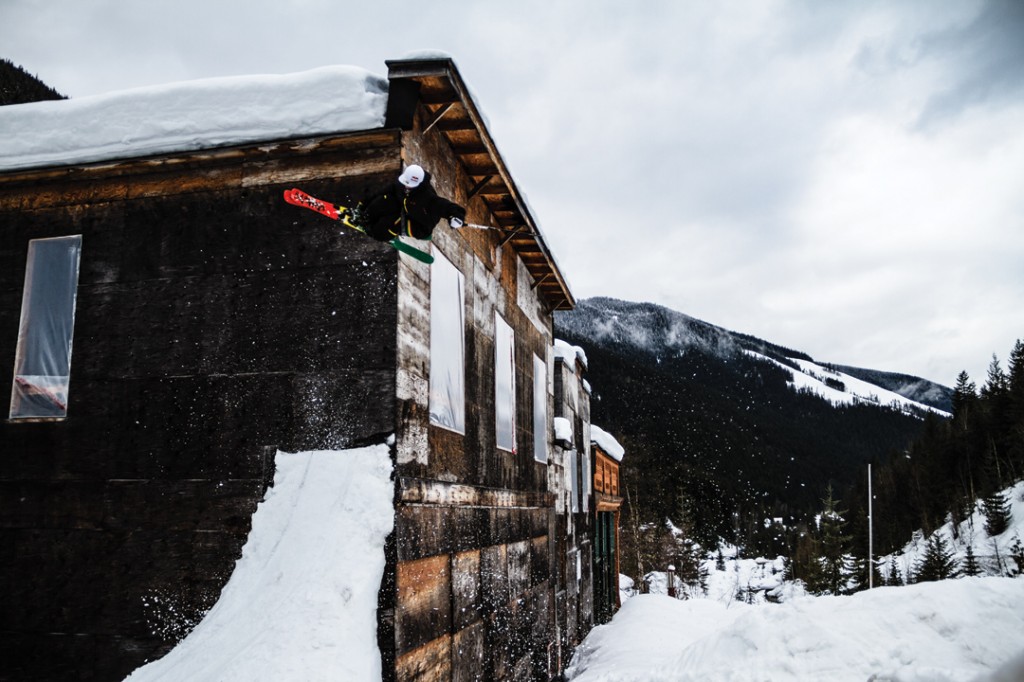
A classic Tanner Hall style flatspin to a next-generation opposite tranny landing near Sandon, BC. Photo by Jess Tidswell.
By working out more than five hours a day for a year, Tanner has put on 20 pounds of muscle. He leg presses 540 pounds. People have noticed. The skinny kid is a muscle-bound man. It seems that Tanner Hall has a higher purpose. Yes, his goal, as it was when he was five years old, is to go to the Olympics and win a medal. His ability to win at the highest level is well documented. But his contribution to the sport of skiing is less celebrated. Like his hero Glen Plake, his genuine love for the sport runs deep, far beyond money or medals.
“He wants to inspire. He wants to make the sport as big as it can be,” says Gerry Hall. “He lost ground and if he can take it to the Olympics, it is that much easier to help everyone in the sport. He doesn’t see his skiing being over after the Olympics. Going beyond the Olympics, he wants to soar. He wants skiing to be bigger than life. I think he wants to see people on snow, happy and charging and getting everything they can. If he could progress the sport to a new level he would be satisfied.” Despite the difficulty expressing himself in the public eye, the frustrations, the rehabilitation—the rollercoaster of Tanner—the motivation simmering beneath Tanner’s act is a second chance to show people that skiing is bigger than just a sport. A forum for the public to see the art and expression available to anyone who puts skis on their feet.
Although the focus is still Sochi, Tanner has not stopped sharing his view of skiing in other ways. By teaming up with Iberg to make The Education of Style, Tanner hoped to disrupt the ski-film formula and demonstrate his belief in the future of skiing through two of the most progressive skiers of the new generation, Henrik Harlaut and Phil Casabon. They set out to create a movie that is more style than high-octane stoke. Both Casabon and Harlaut say they grew up emulating Tanner’s style and creativity, but Tanner shoots back about the duo, “They are my heroes! These kids are the way it should be. Having fun and defining style.” And Tanner’s comeback to filming includes all aspects of freeskiing—urban, pillow lines, and double-corks in the backcountry—in a way that few skiers could pull off. His segment holds its own next to young-guns Casabon and Harlaut. The only aspect it doesn’t cover, Tanner is quick to note, is the one he is now focusing on again: halfpipe. Harlaut says, “I still believe he is the best pipe skier in the world.“
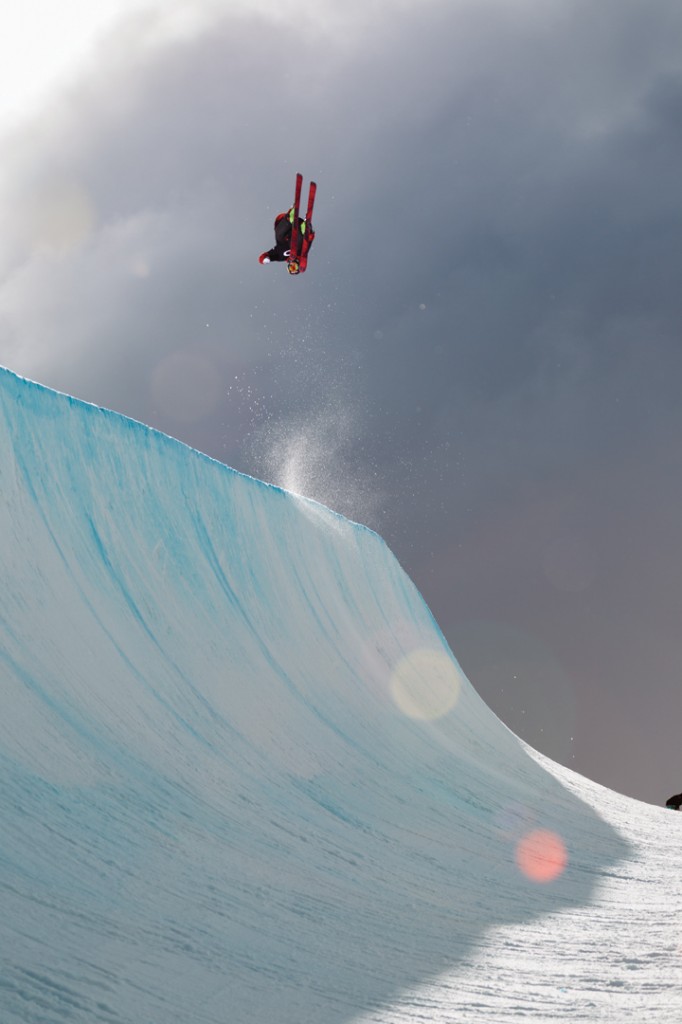
When asked about the Olympics, Tanner replies with a familiar tone of confidence, “Hopefully, I make the team. And [then] I’m going to take back what’s mine. Dedication, patience and hard work. The patience I’m still learning. It’s a different time in my life. I don’t have regrets, the stupid shit, without all that, I wouldn’t be who I am. I needed to make those mistakes and learn those lessons. And if you don’t respect yourself, you’re not living. This is what I’ve learned.”
Left: Upside down south of the equator, Tanner trained in the halfpipe at Snow Park, NZ during what was his final activity as a Red Bull athlete in August of 2012. Photo by Miles Holden/Red Bull Content Pool.
It’s a new type of self-awareness. He hopes he can convey that to the world. “For everything I’ve done in skiing, you either hate me or love me. I don’t need everyone to love me, but I would like for people to take me for who I really am.”
For right now, not everyone agrees who Tanner really is. On the eve of Tanner’s first competitive outing since his injury, he parted ways with his long-time sponsor Red Bull. Numerous confrontations and perceived slights left Tanner feeling disrespected by the drink company. As usual, he made his feelings well known to his sponsor, sometimes in public. Red Bull put him on probation. Something broke after a Red Bull training camp in New Zealand and both sides released statements that basically said it was over. “I guess I don’t fit the Red Bull image anymore,” Tanner shared with me directly. “Bigger, better, faster. It kinda hurt that they didn’t want to try another style. We could have dominated. But it’s a blessing in disguise. I want to be surrounded by people who support me and understand me. I still have great friends there, and no doubt they have done amazing things for the sport, but I have seen a lot of changes over the years.” With a rising tone of frustration in his voice, he pauses. “Life is too short,” he says. “Don’t let yourself get worked up.”
Red Bull commented for this article as well: “Tanner is an amazing athlete and a true pioneer of the sport. We spent 11 amazing years together and supported him through both the ups and the downs. As with many relationships however, sometimes they run their course. In this case Red Bull and Tanner Hall no longer saw eye to eye and felt the best course of action moving forward was to go our own way. There is no ill will towards Tanner, and we wish him the best of luck in all his future endeavors.”
“For everything I’ve done in skiing, you either hate me or love me. I don’t need everyone to love me, but I would like for people to take me for who I really am.”
Deep down, Red Bull’s decision likely motivates that part of Tanner that has always thrived in the face of adversity. It’s fuel in the engine to prove himself over and over again. True to form, the day after being dropped, at his first halfpipe competition since X Games 2009, he returned to the sport with a win. “I felt better than ever, less stressed and more calm, surrounded by some familiar faces and some new faces too. It felt right. The level of riding was high, even though guys like [Kevin] Rolland and Simon [Dumont] were not there. It gives me more fire and confidence.” No doubles were thrown in the tough weather at the New Zealand Open, so there are still questions about how Tanner will stand up against the progression that has happened in his hiatus from competition. But after this first outing, as Gerry Hall stated, “I wouldn’t bet against him.”
No one, even Tanner himself, is suggesting that he is a sure thing for Sochi or that his troubles are all behind him. It’s a long road and many people wonder what will happen to Tanner if he doesn’t make it to the Olympics. “That injury took me out of skiing for a long time. If you don’t think about anything else other than [skiing] for years and years, then you have that one thing taken away from you—the thing that defines who you are—you find out who you are. I had to learn that the hard way. CR was always thankful for his injury. I’m thankful for mine. I learned who I am without skiing. I know after skiing I’ll be good. I found the beauty of life. Friendships, family, nature, art, music—there’s so much out there.”
His family has noticed this change in Tanner. “He is committed to improving himself as a person,” Tyson explains. “He’s rewriting his story again.” Darla, always her son’s biggest front row cheerleader, chokes back tears as she tells me, “Tanner, he has always had the biggest heart. It’s so refreshing to have the Tanner I’ve always known back with us. When I see him now it’s not what can you do for me, it’s what can I do for you.”
The mop-haired kid I picked up in 2001, through raw talent, dedication, passion and unprecedented victory, became the greatest skier our sport has known. But it is through loss, pain and patience, along with some help from his guardian angel, that he is on a path to becoming a greater person. “I might not have finished high school. Never went to college. But I feel like I’m earning a degree in life. That is priceless. That’s real.”
Tanner’s story is far from finished. Many challenges lie in wait on his road to redemption. Can he really quit drinking for good, even after recent lapses? Stop smoking? The battle with substance abuse is a lifelong bout of shadow boxing. Tanner too, will continue to dance with those demons. Skiing gives just as it takes away. The skill that carried Tanner to the top also brings injuries, losses and influences that amplify his struggles. One thing is clear, the person most responsible for his redemption is the same person who can stop it: Tanner. The education of that skier, that person, continues today.
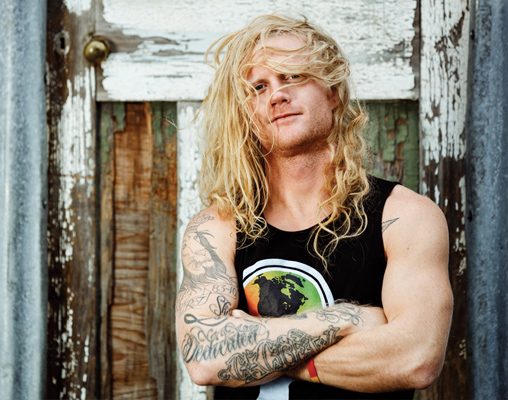
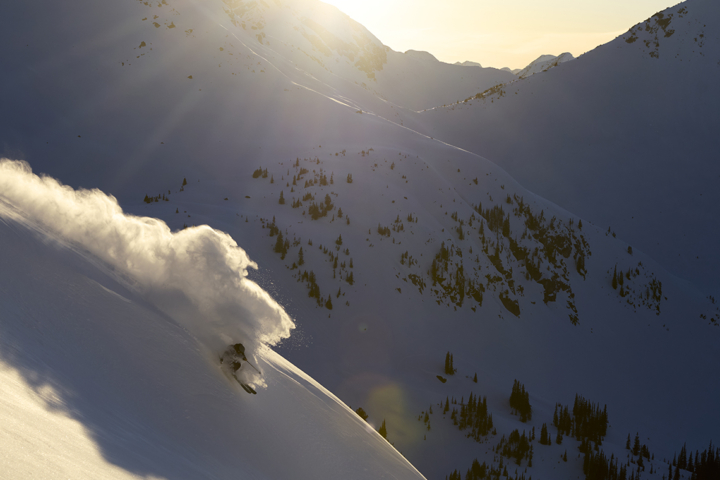
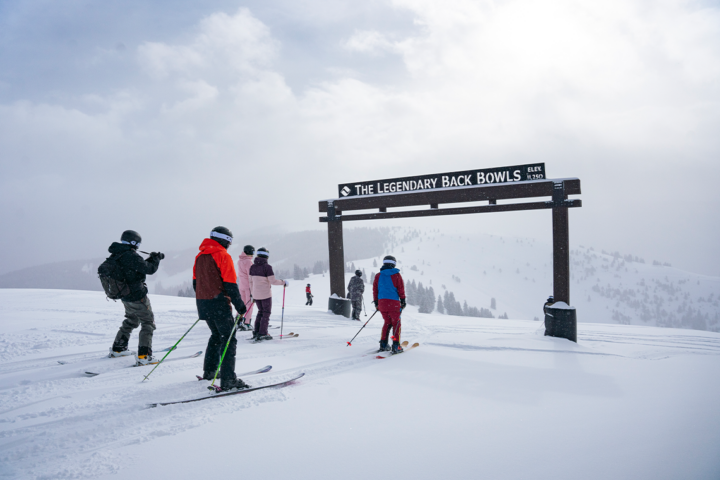
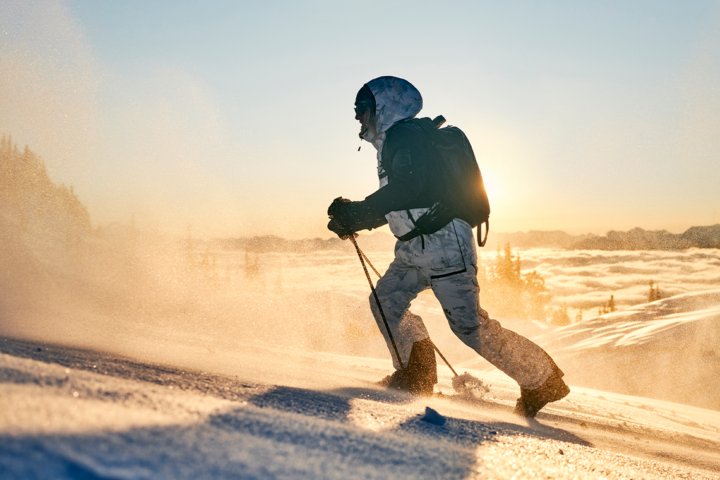
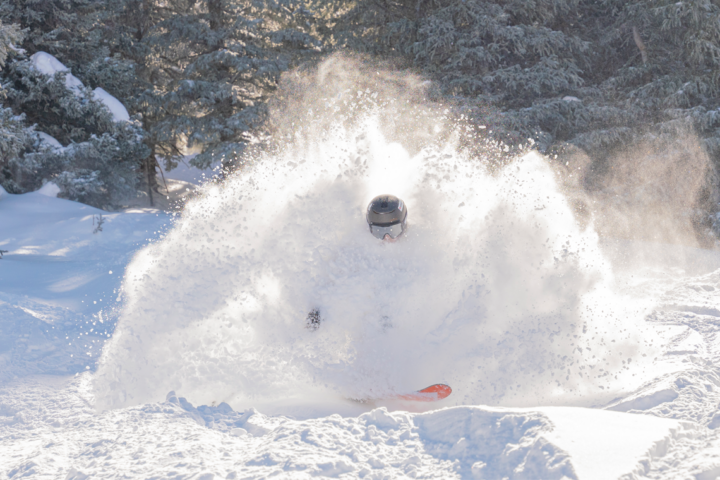
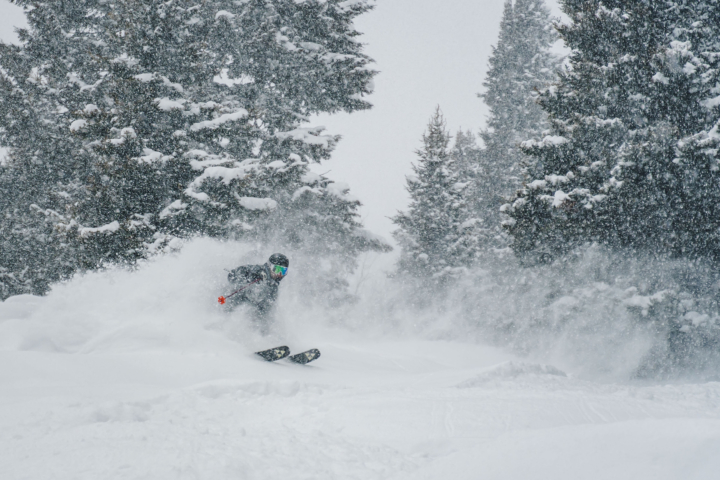
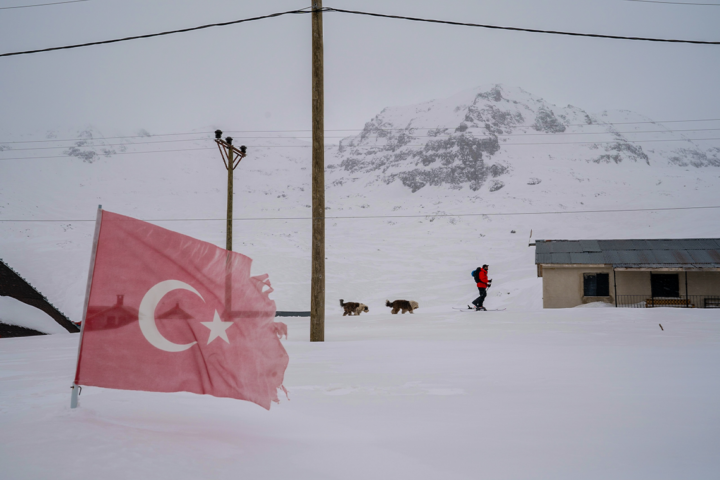


5 thoughts on “Professional Skier Profile: Speaking with Tanner Hall about his road to redemption”
Comments are closed.